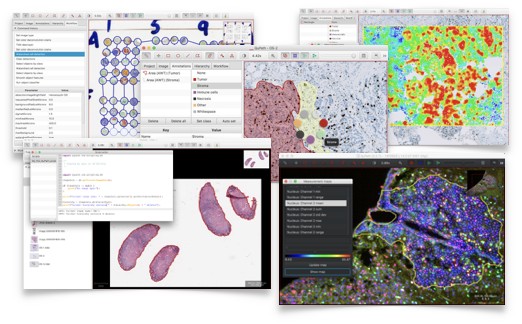
QuPath
QuPath is open source software for whole slide image analysis and digital pathology.
QuPath is being actively developed at the University of Edinburgh and offers a wide range of functionality, including:
- extensive tools for annotation and visualization
- workflows for both IHC and H&E analysis
- novel algorithms for common tasks, e.g. cell segmentation, Tissue microarray dearraying
- interactive machine learning, e.g. for cell and texture classification
- an object-based hierarchical data model, with scripting support
- extensibility, to add new features or support for different image sources
- easy integration with other tools, e.g. MATLAB and ImageJ
All in all, QuPath aims to provide researchers with a new set of tools to help with bioimage analysis in a way that is both user- and developer-friendly.
QuPath is free and open source, using GPLv3.
To download QuPath, go to the Latest Releases page.
For documentation, see the QuPath Wiki
For help & support, try image.sc or the links here
Building QuPath with Gradle
Building software can be tricky, but hopefully this won't be at all - thanks to Gradle.
What you need is:
- OpenJDK JDK 11 (or later)
- JPackage (currently there is an early access build at jdk.java.net)
- The QuPath source code (you can get it from GitHub with the Clone or download button)
You should then start a command prompt, find your way to the directory containing QuPath, and run
gradlew.bat createPackage -Ppackager=/full/path/to/jpackage.exe
for Windows, or
./gradlew createPackage -Ppackager=/full/path/to/jpackage
for MacOS and Linux.
This will download Gradle and all its dependencies, so may take a bit of time (and an internet connection) the first time you run it.
Afterwards, you should find QuPath inside the ./build/dist. You may then drag it to a more convenient location.
Congratulations! You've now built QuPath, and can run it as normal from now on... at least until there is another update, when you can repeat the (hopefully painless) process.
You can get Gradle itself from http://gradle.org -- but
in keeping with the Gradle guidelines, the Gradle Wrapper is included here. That makes things easier, and you don't need to download Gradle separately. Here's the Apache v2 license.
Libraries used within QuPath
To see a list of third-party open source libraries used within QuPath (generated automatically using Maven), see THIRD-PARTY.txt.
Full licenses and copyright notices for third-party dependencies are also included for each relevant submodule inside src/main/resources/licenses, and accessible from within within QUPath distributions under Help → License.
Background
QuPath versions up to v0.1.2 were created at Queen's University Belfast and released open source under the GPLv3.
Copyright 2014-2016 The Queen's University of Belfast, Northern Ireland

Design, implementation & documentation
Additional code & testing
Group leaders
- Prof Peter Hamilton
- Prof Manuel Salto-Tellez
Project funding
The QuPath software has been developed as part of projects that have received funding from:
- Invest Northern Ireland (RDO0712612)
- Cancer Research UK Accelerator (C11512/A20256)

